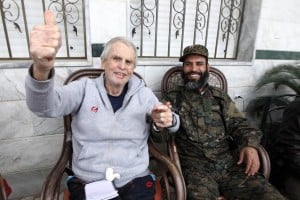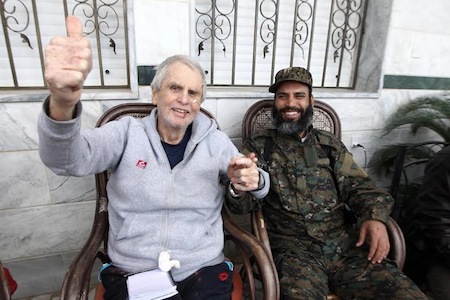By Adam Ali.

Canadian Terry Kirk and . . .[restrict]LNA rescuer, Salah Bulaghib (Photo: Abdulla Doma)
Benghazi, 19 December 2014:
The daring rescue of a Canadian cut off for 21 days by fighting in Benghazi, nearly went horribly wrong when his mobile phone lit up and rang while he was being spirited away Libyan National Army soldiers.
The rescue party immediately attracted fire from nearby Ansar Al-Sharia militiamen and 79 year-old Terry Kirk was wounded in the chest. He had to be carried to a waiting vehicle. Seven members of the team that snatched him from the Benloun district were also injured in the fighting, but none seriously.
As he recovered at the Benghazi Medical Centre, oil field worker Kirk told his story to the Libya Herald and was full of praise for the men who ran considerable risks to save him. ““I have never seen such bravery in all my years” he said.
When fighting broke out in the district, he said that he was rushed to shelter in a house: “A Libyan work colleague had taken me to the house, locking me inside for my own safety, for what I thought would be 24 hours until he could transfer me to a safer location. Unfortunately, he never came back”.
Kirk’s plight was unknown for over two weeks, until at the end of last month, firm information came in as to his whereabouts. But the area where he was hiding was still controlled by Ansar.
The LNA decided to mount a covert rescue operation. “But it was very difficult for us to get access to the house because the area had not yet been liberated,” rescue team commander Salah Bulaghib told this paper, as he sat beside a recuperating Kirk.
“We were unsure of the exact location of the Canadian and on our first attempt to go in, two men from our team were injured by gunfire and had to be transferred to the hospital”.
Meanwhile, Kirk, who has a mechanical heart valve, had been out of medication and food for days.
“I was starting to lose strength,” he said, “I had asked the friend who set me up in the house for food and batteries when I arrived. Thinking that I would only be there for 24 hours, he brought me a can of tuna, a can of sardines and a few lemons. I managed to find some eggs, a few potatoes and some baby formula in the house, which I lived off of for the rest of my time there”.
Kirk, who holds a Canadian passport, renounced his American citizenship during the 1980s because Bush administration sanctions barred him from working in the Libyan oil industry. He has since spent much of his life here.
When the rescue team had crept up to the house and finally found him, Kirk said that they were surprised at how old he was. He said that the young men were very gentle with him, even though the situation was very dangerous and slowing down put them at great risk.
“When I got out of the house, it was dark and we had to scale a nine-foot wall. One of the guys got down on his hands and knees so that I could step on his back to get onto the wall.
“As I balanced on top, he jumped over and squatted down again so that I could step down. From there, one guy lifted my left arm and another lifted my right and we started running faster than I knew I could run”.
Then disaster struck.
“It was at that moment that my cell phone started ringing, causing my pocket to light up the darkness. Immediately, we heard a barrage of gunfire. I was shot through the ribs, but the bullet missed my spine and my organs,” Kirk continued.
“We quickly arrived at a pick-up truck and they threw me into the back. One of the men jumped on top of me, acting as a shield as a stream of bullets hit the truck. We drove about five minutes and switched vehicles. Again, one of the soldiers laid over me as a shield until we arrived at the hospital,” said Kirk.
According paramedic Mustafa Haroun, seven men were wounded during the mission, but none sustained serious injuries.
“I have never seen such bravery in all my years,” Kirk said, “and I am an old man”.
He told this newspaper that after spending a third of working life in Cyrenaica, he was reluctant to leave but the embassy had arranged for him to return to Canada. “But I’m not through working for this country yet” he said.
[/restrict]







